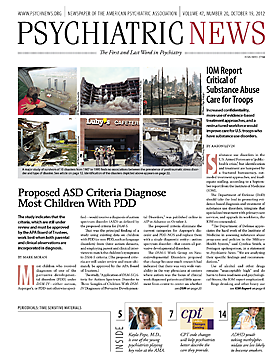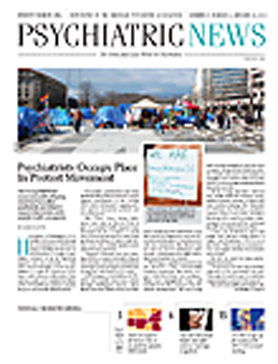Monoclonal antibody (biologic) medications are very expensive, costing $1,000 or even $2,000 a month, because they are not synthesized, but produced biologically—for example in mouse cells.
He based the latter prediction partly on results of a proof-of-concept study by him, Charles Raison, M.D., an associate professor of psychiatry at the University of Arizona, and colleagues. Their study showed that a biologic medication was able to reduce depressive symptoms in some subjects who had suffered from major depression for an average of 15 years. The results were published online September 3 in the Archives of General Psychiatry.
Cytokines Can Sabotage Antidepressants
Increased concentrations of inflammatory biomarkers predict antidepressant nonresponse, and inflammatory cytokines are known to be capable of sabotaging and circumventing the mechanisms of action of antidepressants. Thus Miller, Raison, and colleagues wanted to find out whether an inhibitor of the cytokine tumor necrosis factor called infliximab might be able to reduce depressive symptoms in individuals with treatment-resistant depression. Infliximab, a biologic, has been approved by the Food and Drug Administration for treating inflammatory diseases such as rheumatoid arthritis, ulcerative colitis, and Crohn’s disease.
The study population was 60 subjects who had been suffering from major depression for an average of 15 years in spite of efforts to relieve their depression with conventional antidepressants. Half the subjects were given infliximab and half were given a placebo over a 12-week trial. The infliximab was provided at no charge by its manufacturer, Centocor OrthoBiotec Services. Otherwise it would have been too expensive for the researchers to use the drug since they had only a small National Institutes of Health grant to fund their study, Miller said.
At the start of and throughout the study, subjects were also evaluated for levels of C-reactive protein, an indirect measure of inflammatory cytokine activity. And at both the start and end of the study, the subjects were evaluated for depression with the 17-item Hamilton Rating Scale for Depression (HAM-D). Finally the researchers compared the depression outcomes of the two groups.
The infliximab subjects who had had a concentration of C-reactive protein greater than 5 mg/L at the start of the study experienced a significantly greater decrease in depression symptoms than the placebo group did. However, the placebo group experienced a significantly greater decrease in depression than did infliximab subjects with a baseline C-reactive protein concentration of 5 mg/L or less.
These outcomes both surprised and intrigued them, the scientists said. For example, “Halfway through the study,” Raison told Psychiatric News, “we were seeing all these ‘miracle cures’—people who had failed multiple antidepressants were telling us, ‘Doc, I know that I don’t know what I’m getting, but it’s got to be the real thing because I feel so much better.’ Then we broke the blind and found that more than 50 percent of the ‘miracle cures’ had received three infusions of salt-water placebo.”
So what was going on with the placebo group? Well, perhaps nothing special because the placebo effect against depression can be so strong, the scientists said. But perhaps something was occurring with the infliximab subjects who had had little inflammation at the start of the study, they speculated. “These results,” they wrote, “suggest that some minimal level of peripheral inflammatory activity may be required to exhibit an antidepressant response. It is becoming increasingly apparent that low, physiologic levels of cytokine activity are essential for a number of brain processes associated with protection from depression, including neuroplasticity and neurogenesis.”
Whether that is the case, though, the more important finding, the scientists indicated, is this: Those infliximab subjects who had experienced C-reactive protein levels greater than 5 mg/L at the start of the study experienced significantly less depression than placebo subjects did. They experienced a 3.1 point greater reduction in HAM-D scores from baseline to week 12 than did the placebo group. This between-group difference in the study’s primary outcome measure is similar in magnitude to differences typically seen between antidepressant medications and placebo in randomized studies and is considered a clinically meaningful difference according to the National Institute for Health and Clinical Excellence.
Thus, treatment-resistant depressed patients with high levels of inflammation might be helped by infliximab, this finding suggests.
“At first we were disappointed that infliximab was not successful in all treatment-resistant depressed patients,” Miller said. “Then we realized that a drug that targets inflammation should probably be successful only in subjects with high inflammation (or high C-reactive protein). I should note that high C-reactive protein levels are also one of the best predictors of who is going to respond to infliximab in patients with inflammatory disorders like ulcerative colitis and Crohn’s disease.”



